Monday Feb 16, 2026
Monday Feb 16, 2026
Saturday, 2 November 2024 04:18 - - {{hitsCtrl.values.hits}}
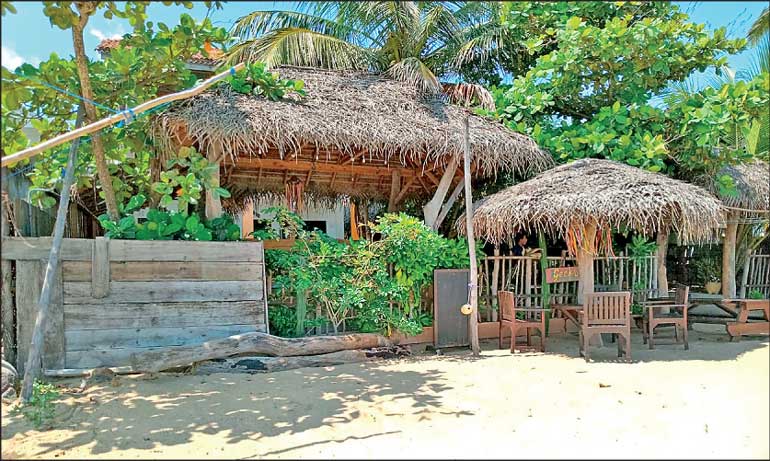
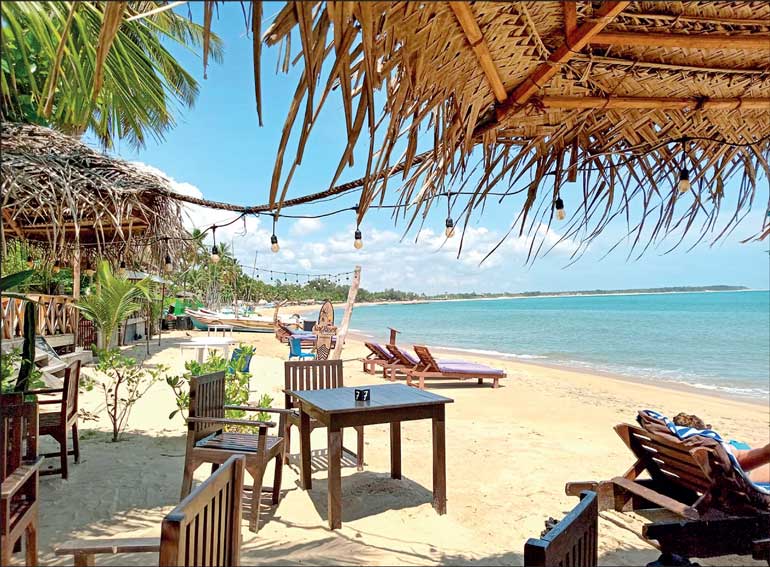
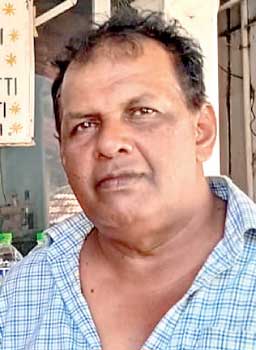 |
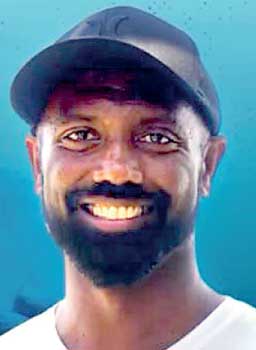 |
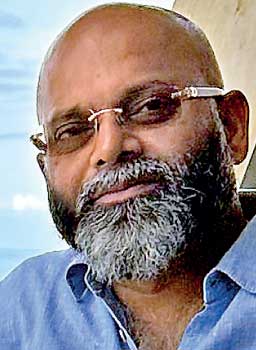 |
| Abdul Wahab | Lalanka Palliyaguruge | Saagie Navaratnam |
By Surya Vishwa
Arugam Bay. Where the beaches wear gold and the waves whisper, rasp and roar, beckoning the visitor mysteriously. Those who are enamoured follow the call and go on an enticing, tumultuous, frothy sea borne journey of highs and lows that we call surfing. It is a surface water sport that is popular globally and which has existed from ancient times although the manner in which it is carried out is different in modern times where a surfing board is used whereas earlier it was just the human anatomy directly wrestling with the waves.
In Sri Lanka one of the most alluring surfing sites is Arugam Bay adjacent to Panama and Pottuvil in the East Coast. It is in Arugam Bay that the World Surf League held its international surfing event in 2019 attracting around 100 surfers from over 25 countries.
Today we seek to hear the many unheard voices of Arugam Bay and cut through the exaggeration and fear psychosis that has cast a veil of trepidation about visiting this idyllic coastal haven. The area is home to the main three ethnicities of Sri Lanka; Sinhala, Tamil and Muslim and the majority of residents in this region are Muslims – over 50% and then Tamils – around 30% with Sinhalese making up the rest of the population alongside some Burghers (Sri Lankans of Dutch and Portuguese origin).
In my stay in the area, having spoken in detail with local and foreign residents in Arugam Bay – several foreigners are domiciled here – mostly having married Sri Lankans, what strikes me is the potential to exhibit to the world the peacefulness with which everyone gets on. There is some competition, yes, in operating the business of tourism and at times this is manifested more between some segments of foreigners and Sri Lankans, but overall, Arugam Bay is a place where this country can proudly showcase national unity.
Parallelly, it is also a rare case of international harmony where tourism investors from many countries, including Israel, live with those of other nations. Whatever the global war-peace dynamics may be, Arugam Bay is a zone of peace. We will now get ready to listen to some of the authentic voices from Arugam Bay.
The Harmony page is an initiative committed to giving energy to that which augments qualities associated with love, compassion, empathy and kindness that exists almost in equal proportions to the injustice, inequality, war mongering, fear psychosis and hate speech in this world.
Abdul Wahab and his small food outlet
Below is the narrative of Abdul Wahab, a resident of Arugam Bay/Pottuvil, who is involved in different tourism entrepreneurship ventures in Arugam Bay. Among the few medium scale tourism initiatives he manages includes a moderately priced small food outlet which offers Sri Lankans food at local prices. It is one of the rarer places that the Sri Lankan police and army personnel who are on duty in the area can purchase a coffee or a tea at usual prices alongside a vegetable rotti or samosa.
“Myself, my wife and three daughters were born and brought up in Pottuvil. I lived in Dubai for 25 years and was employed there in the catering and restaurant business. I learnt a lot in the different areas connected to the food industry. Dubai is a place where all nationalities meet and if we observe keenly we can learn a lot from the global expertise there. I returned to Sri Lanka in 2015 and since then have been involved in Arugam Bay tourism. There are foreigners and locals who come almost in equal proportion to Arugam Bay to enjoy the sea front atmosphere. If we compare the percentages, I can say that there are more local visitors than foreigners overall as there is sometimes prolonged out of season lag in foreign tourists.
“In my personal experiences, sometimes the Sri Lankan visitors do not haggle and just pay whatever we tell them as the price but often foreigners from Western countries bargain a lot. So as a rule I make it a point to be very courteous to Sri Lankans equally as I am to foreigners because I know that during COVID time when the country did not have foreigners coming in, it was the wealthy Sri Lankans who travelled to out-of-Colombo locations and kept the tourism oriented economy from crashing.”
Does he have any preference over foreign tourists who visit his eatery?
“No. How can we? Everyone comes here. British, Germans, Israelis. I am not bothered where they are from. If they pay, treat my restaurant and Arugam Bay as a whole with respect and not clutter the place and in general behave decently, then why should we have a problem? Whatever else may take place in the world, we have to remember that this is our home – Sri Lanka. This is a place of peace and this is what we should protect.”
Saagie Navaratnam, the tourism investor
As I finish speaking with Abdul there is another customer. He gets off his vehicle and sits down in a familiar fashion. He then orders a vegetarian meal. The eatery of Abdul is not a specifically vegetarian one. But for this gentleman – Saagie Navaratnam, a Sri Lankan and Canadian dual citizen whose hometown is Jaffna, Abdul instructs his staff to prepare a ‘pure vegetarian’ meal.
Saagie Navaratnam is a significant tourism investor in Sri Lanka. He is chairman of MaRadha-Colombo, a three-star hotel in Marine Drive in Kollupitiya and an expert in boat/cruise tourism. He laments that Sri Lanka as an island is nowhere near understanding and conceptualising the boat related tourism scope. He is equally an enthusiast in promoting indigenous lifestyle and food and has just concluded the first edition of the annual Sri Lankan southern food festival in his hotel in Colombo.
Below are his comments on how Sri Lanka could project this country in a commonsense driven manner taking into account the increasingly volatile and fractured world we are living in.
“Yes, there are wars in this world. We have also emerged from one. I was affected by the 1983 riots in Sri Lanka and my family businesses in Colombo Fort were completely destroyed. But can we say that all Sinhalese did this? No. We cannot label a particular race no matter what. I find it ridiculous that we are divided on this earth on religious grounds. I am a Hindu but when my two-year-old son had a cyst in his head we took him to Lourdes where we dipped him into the well alongside the shrine of mother Mary there. We had faith and he was healed. I live in Canada and visit Sri Lanka every year. We should ensure that our tourism models are authentic to the traditions and natural resources of our country. For example there does not seem to be any traditional medicine outlet in Arugam Bay – you call it wedakama in Sinhala isn’t it?”
As we speak, military vehicles pass with a general high security impression being given which in turn could communicate paradoxical views. We discuss a possible different approach and focus on the need for development of an integrated national policy that is created with the direct involvement of the people; a policy that encompasses tourism, investment, arts/culture, imports, exports, farming, fishing and security. And a foreign policy that takes into account these and other factors connected with the integrity and wellbeing of all Sri Lankans. We discuss how a national policy should be inviolable and unchangeable irrespective of the stances/views/whims of individuals who get elected into political positions.
We below continue the verbatim opinion sharing of this Sri Lankan origin tourism investor who has also contributed to enhancing the advanced knowledge economy through a local engineering design branch in Colombo which had made the structural steel fabrication drawings for the new twin tower building in the US after 2011.
“All countries can maximise their potential in many diverse ways. As an engineer specialising in steel based construction I can see that Sri Lanka has undervalued both its human and natural resource capacity. The people of Sri Lanka are intelligent. If they are exposed to global developments in areas such as diversified construction they could do wonders while keeping a strong grasp on the ancient knowledge systems of the land. What Sri Lanka desperately needs is to create far thinking policies that will take into account its objectives in creating a better economy for its people. Some of these policies can be developed with basic common sense – for example we can just think that when any country has military convoys in uniforms in armoured cars that it could give the impression to tourists that the country faces some serious security threat whereas there are many locations across the Western world where there are rampant threats for anyone at anytime owing to the gun culture.”
“In the local context, while the presence of the tri-forces is definitely required, what is needed is an approach that will focus on very high level training on both intelligence gathering and handling a situation without scaring off tourists. For example if there were more military personnel trained to handle security threats dressed in civil attire without drawing attention to themselves it would really be beneficial in every way. Back to the need to focus on our natural resources I feel that above all we need an economic policy that will look at the vast range of earth bounty this country has – its herbs, its traditional food, indigenous medicine and above all the resources of the seas. Is it not ironic that living on an agrarian island we are importing fish and rice alongside many vegetables that are grown here? Hence we certainly need a national policy that will directly attend to these situations. I reiterate that we have not explored cruise tourism so that tourists can travel from one point to another by ship or boat. If I have a boat, where do I dock my boat in Sri Lanka? In Canada I have a boat. I have a boating license.” What this globally recognised expert shares is worth reflecting on by every Sri Lankan who can then take some action to do his or her part to make these ideas a reality.
Everyday realities of Arugam Bay
We now move to our interaction with a British national who has been living in Arugam Bay for the past two decades. We have respected her request for anonymity as she shares her views on the everyday realities of Arugam Bay.
“I first visited Arugam Bay in February 2004, and had a very relaxing, chilled holiday where I met my future husband. I returned later in 2004 and stayed for longer, to get to know him and Arugam Bay better. I then decided to come and live. My tickets were booked for 02/01/2005. The Tsunami hit but I came anyway. After some months of planning we decided to open up a small shop, selling surf shorts, t-shirts, postcards, wooden masks and other souvenirs as there was little else on offer for visitors at that time. We also sold our homemade ice cream and this became quite well known. We wanted to expand to sell cakes and desserts but our landlord wasn’t too keen so we found some great beachfront land which was also connected to the main road and bought that in October 2005. We then gradually built it up to what it is today.”
“There have been many ideas of how to tackle the issues that come up in Arugam Bay and one main one this year is the late night/early morning parties that happen every night at a different establishment within the bay. Despite being against the law, they still continued throughout the whole season. This understandably disturbs everyone else, especially local residents who have children and local jobs – the staff, drivers and others who work within the tourist industry here and of course all the vast majority of tourists that don’t join the parties, including families and surfers. We are all disturbed by very few.
“One solution is for a “party” zone to be developed a few kilometres away from Abay and I understand a site has been earmarked. This will undoubtedly ease the current situation but also may bring other issues such as impacting the wildlife and nature in that area. Other challenges include services such as line water, electricity (actually pretty consistent this season, but as more development happens then this will be under more strain). Proper management of garbage collection to ensure composting, and recycling is being done. So yes, things are developing albeit slowly. Arugam Bay has always remained in a kind of bubble, all through the conflict years, the year of the bombs and COVID times. As a foreigner living here I have generally felt safe and blessed to be near the ocean.”
Lalanka Paliyaguruge, the surf tourism expert
We now feature the views of Lalanka Paliyaguruge, an expert on surf tourism who is the Vice President of the Sri Lanka Surfing Federation.
“I have always loved water sports, but for the longest time, I didn’t try surfing because I live in Colombo and didn’t have access to a surf break. About 15 years ago, I tried surfing for the first time in Arugam Bay, and that was it—I was hooked for life. Over time, I realised there’s significant potential for surfing in Sri Lanka, both as a sport and as a valuable source of foreign income. As a result, a few other like-minded surfing enthusiasts and I formed the Surfing Federation of Sri Lanka. In terms of surf tourism, I would say Arugam Bay is nearly optimised. On the other hand, surfing as a sport is still in its infancy. Let me elaborate.
“When it comes to surf tourism, I believe in sustainable practices. Tourism should be organic and able to accommodate the surfers who come specifically for Arugam Bay’s waves. With only 12–13 surf breaks, these spots get overcrowded during peak season. I don’t think we can support more surfers than we currently do, as all surf breaks are operating at full capacity. Since the formation of the Surfing Federation of Sri Lanka, Sri Lankan athletes have participated in numerous international surfing events. To name a few, we competed in the Asia Surfing Games held a couple of months ago in the Maldives and in Japan two years ago.
“Additionally, the World Surf League (WSL) held its QS300 event in Arugam Bay in 2019, which attracted around 100 surfers from approximately 25 countries. Now, regarding surfing as a sport, it’s still very niche in Sri Lanka. Only a handful of Sri Lankans have the opportunity—or courage—to experience this amazing sport. Additionally, the high cost of surfboards limits accessibility for locals, while traditional fears of the ocean in Sri Lankan society further restrict exposure to surfing.”
Gopalakrishnan Manoj, the accounting, company incorporations and audits expert
We will now listen to Gopalakrishnan Manoj whose expertise is in accounting, company incorporations and audits who had interacted with several foreign tourism investors interested in establishing hotels in Sri Lanka. He has to date worked with tourism investors from US, UK, Germany and Israel. We contacted him to clarify if the terminology ‘synagogue’ was correct as some international media had referred to recently in relation to a premises belonging to an Israeli national in Arugam Bay. His response is as below.
“My role was limited to the company’s incorporation. As per the Article of Association it is a tourist restaurant and they provide kosher foods to their customers alongside conducting some events on Jewish festival days. It is not a religious place.”
We will close this feature on Arugam Bay by listening to the views of Somlak Janchoen, a Thai-African origin national who, with her family, manages the Siam View pub and restaurant which is a one of a kind space for watching world sports on big screens while sipping beer and enjoying the evening.
“Arugam Bay is a wonderful place indeed and we are very happy to serve global visitors here and in all my years we never had any noticeable differences with anyone, including other service providers. The half a dozen or so establishments locally said to be run by foreigners are actually under the full control (51%++) of their local partners. Being in a Buddhist and coastal country akin to Thailand I can say I love both nations and I wish that religious differences would be resolved as they were within my own Muslim/Buddhist mixed family. Our restaurant gets many visitors including from India, China and Asian countries but for some time more than 50% of my diners are from the Middle East (Israel, etc.).”
Note: The Harmony page team strongly believes that sensitive and sensible mass media tied up with equally sensitive and sensible tourism models can change our warring global sphere. Although this may sound naïve in a world where injustice and cruelty reins, it can be that the compassionate awakening of one heart can lead to a caring smile that may change this world. It is towards this that we strive – to change one heart at a time. Continuing on the path to hate can never bring peace.